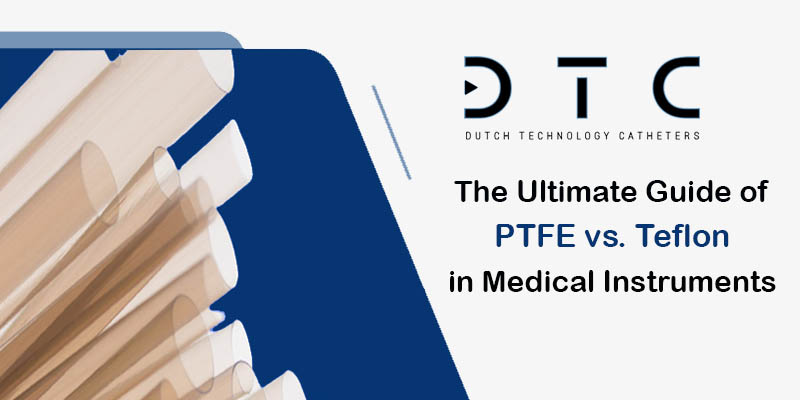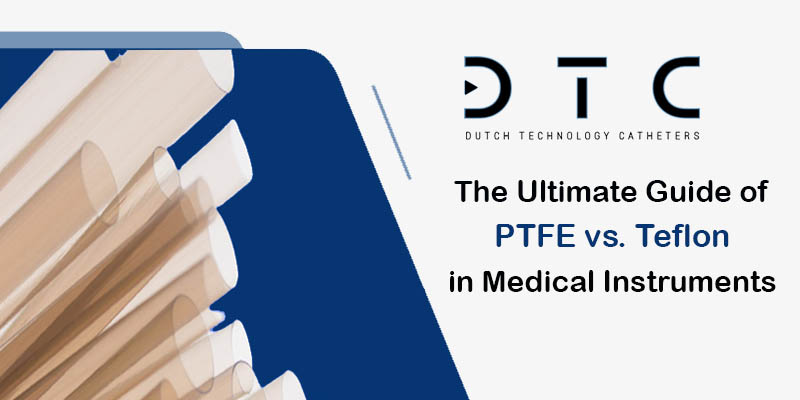
The Ultimate Guide to PTFE vs. Teflon in Medical Instruments
With medical technology always advancing, the materials used in medical instruments have also evolved. PTFE and Teflon are two such materials that you must have heard about too often. But what exactly are these substances? Why are they important in medical instruments? And the million-dollar question: Is PTFE safe? What about Teflon?
In this guide, we’ll explore the properties of PTFE and Teflon, look into their common applications in medical tools, and evaluate their safety standards. So, if you’re in the healthcare sector, a concerned patient, or just a curious mind, stick around for an in-depth understanding of these important materials.

What is PTFE in Medical Instruments?
Let’s discuss PTFE as a main material in medical instruments:
PTFE Materials:
Standing for Polytetrafluoroethylene, PTFE is a synthetic fluoropolymer, a type of plastic that has some unique properties that make it incredibly useful in healthcare settings. When you break it down, you’ll find that it’s a polymer made from carbon and fluorine. This unique combo gives it a waxy, non-stick surface. That’s why it’s so sought-after in medical applications. Imagine you’re a surgeon. If your surgical tools are PTFE coated, you’re less likely to have issues with materials sticking, which can be critical during complex procedures.
Common Medical Instruments with PTFE Materials
The versatility of PTFE makes it a superstar in hospitals and clinics. Let’s dig into some of the instruments where you’re likely to find PTFE materials.
- Catheters: The smooth surface of PTFE reduces friction, making it easier to insert and remove these tubes used for draining fluids.
- Sutures: Nobody wants a suture that snags. PTFE ensures that these stitches glide through tissue, minimizing patient discomfort and tissue damage.
- Surgical Mesh: Used in repairing tissue or muscle, PTFE in surgical mesh can help prevent sticking and lower the chances of infection or other complications.
- Endoscopic Instruments: A PTFE coating can help these tools move more smoothly during internal examinations.
- Dental Floss: It’s strong and shred-resistant, making it ideal for dental hygiene.
The Benefits of PTFE Coated Instruments
The medical industry has evolved to produce PTFE coated instruments instead of making the whole instrument out of PTFE. Let’s discuss this aspect:
Why PTFE Coating?
PTFE coated instruments offer several specific advantages:
- Bio-Compatibility: PTFE is bio-compatible, meaning it’s safe to use inside the body. This is crucial for medical instruments that come into contact with internal tissues.
- Corrosion Resistance: Medical instruments need to be sterilized often. PTFE coatings can resist the harsh chemicals used in sterilization, prolonging the life of the instrument.
- Electrical Insulation: PTFE has excellent insulating properties. In electrical medical devices like defibrillators, this is key to ensuring safety and function.
- Anti-Adhesive Properties: PTFE coatings are non-stick. For medical devices that need to insert or remove objects (like catheters or stents), this means less force and less potential tissue damage.
Types of Instruments That Benefit from PTFE Coating
The following instruments often have PTFE coatings to make the most of these benefits:
- Catheter: Ensure other devices pass through them with ease, along with reducing friction and corrosion.
- Guidewire: Better resistance to friction and control.
- Biopsy Needles: Reduced friction allows for easier tissue sampling.
- Endoscopic Tubing: The anti-adhesive properties help the tubing navigate through the body.
- Surgical Staples: The corrosion resistance ensures they remain unaffected by bodily fluids.
The Role of PTFE Lubricants in Medical Instruments
Another way to use PTFE in medical instruments is as a lubricant. Let’s discuss a bit before jumping on to the next section:
Importance of Lubrication
In medical settings, lubrication is essential to make sure tools work smoothly and efficiently. Whether it’s in surgical tools or diagnostic instruments, good lubrication can mean the difference between a smooth operation and unnecessary friction that could harm patients.
Why Choose PTFE Lubricants?
PTFE lubricants offer several advantages for medical instruments:
- Long-Lasting: They don’t dry out or lose effectiveness quickly.
- Chemical Resistance: They withstand cleaning and sterilization processes.
- Safety: PTFE lubricants are biocompatible, reducing the risk of allergic reactions or infections.
PTFE vs. Teflon: What’s the Difference?
Now, let’s talk about one of the most popular differences in the medical industry: PTFE vs. Teflon.
Breaking Down the Terminology
First things first, PTFE is actually a type of Teflon. Teflon is a brand name; think of it like calling a tissue a Kleenex. They’re often used interchangeably, but there are some key differences, especially in medical settings.
Where Teflon Falls Short
While Teflon is a household name for non-stick pans, it’s not always the best choice for medical instruments. Some types of Teflon can break down at high temperatures, making them less ideal for medical sterilization processes.
Why PTFE Wins in Medical Instruments
In contrast, PTFE materials maintain their structure even under extreme conditions, making them more suited for medical applications. It can be sterilized and won’t break down, ensuring both safety and longevity for medical tools.
Instruments That Use Teflon
While PTFE is more common in high-demand medical settings, Teflon materials may still appear in:
- Laboratory Equipment: Such as non-stick surfaces for lab dishes.
- Medical Gloves: Some types may have a Teflon layer for easy donning.
- Diagnostic Probes: Where high heat resistance isn’t a primary concern.
By understanding the differences between PTFE and Teflon, you can appreciate why PTFE is often the go-to material in medical instruments.
Is PTFE Safe for Medical Use?
Now that we have established that PTFE materials are highly efficacious, the question is: are PTFE coated instruments safe to use on humans too?
Regulatory Approvals
When we talk about medical tools, safety is the most important thing. Polytetrafluoroethylene (PTFE) has been granted approval for medical use by many global health bodies, including the United States Food and Drug Administration (FDA). The licensing of PTFE for medical purposes is predicated upon a comprehensive battery of tests conducted to ascertain its safety.
Limitations and Concerns
However, it should be noted that no material can be considered flawless. Certain aspects of polytetrafluoroethylene (PTFE) exhibit room for improvement. For instance, the material under consideration exhibits comparatively lower flexibility as compared to certain other materials, thereby potentially constraining its use in certain medical contexts.
PTFE and Long-Term Health Effects
The current research demonstrates that polytetrafluoroethylene (PTFE) does not undergo degradation into hazardous compounds, establishing its suitability for extended periods of use, such as in the context of dental implants or joint replacements.
Conclusion
The significance of PTFE in the medical profession is evident due to its distinctive characteristics, diverse applications, and associated safety considerations. Despite the various applications of Teflon, it is argued that PTFE is a more optimal selection for medical applications. The utilization of PTFE material is justified due to its enhanced durability, non-reactivity with human fluids, and endorsement by health agencies.
It is expected that the reader has now developed a comprehensive understanding of the subject matter. If you have any inquiries, please feel free to leave a remark below. We would be pleased to provide assistance.
Frequently Asked Questions
Can PTFE lubricants be used in all types of medical instruments?
No, PTFE lubricants cannot be used on all types of medical instruments. Polytetrafluoroethylene lubricants have considerable utility; yet, their efficacy may be limited in certain circumstances. It is essential to consult the manufacturer’s instructions related to each medical instrument in order to find out if the utilization of PTFE lubricants is recommended. Certain specialized instruments may require a distinct type of lubrication.
Are there medical settings where Teflon is preferred over PTFE?
Yes, there are times when Teflon is a better choice than PTFE. Teflon, a material known for its chemical and heat resistance properties. It may be utilized in the production of laboratory equipment and less critical medical items that do not require high levels of durability. However, when it comes to providing direct care to patients, polytetrafluoroethylene (PTFE) is typically regarded as the optimal choice because of its biocompatibility and extended durability.
Is PTFE more expensive than other materials used in medical instruments?
Yes, PTFE material is often more expensive than other ones used in medical instruments. However, the long-term benefits of its chemical resistance, durability, and non-toxic nature frequently justify the associated expenses. Over the course of time, tools that are coated with polytetrafluoroethylene (PTFE) have the potential to yield cost savings due to their reduced frequency of replacement and enhanced performance.
Do PTFE coated instruments require special care or cleaning?
No, PTFE coated instruments don’t require special care. Conventional methods of sterilization, such as the utilization of an autoclave, are effective in achieving the desired outcome. Due to its inherent strength, PTFE has a notable ability to effectively withstand the rigorous action of sterilizing chemicals, thereby contributing to the long-term preservation of the tool’s structural integrity.
Can PTFE be used in long-term medical implants?
Yes, PTFE is used in long-term implants. Polytetrafluoroethylene (PTFE) has favorable characteristics for implementation in heart valves and joint replacements due to its biocompatibility and inertness towards bodily fluids. Due to its extended durability, the frequency of replacement is reduced, minimizing the likelihood of encountering issues.
Is Teflon ever used in invasive medical procedures?
No, Teflon is generally not used in invasive medical procedures. Teflon materials are sometimes used in medicine, like in lab tools, but they aren’t usually picked for invasive procedures because they can’t handle heat as well as PTFE can.
